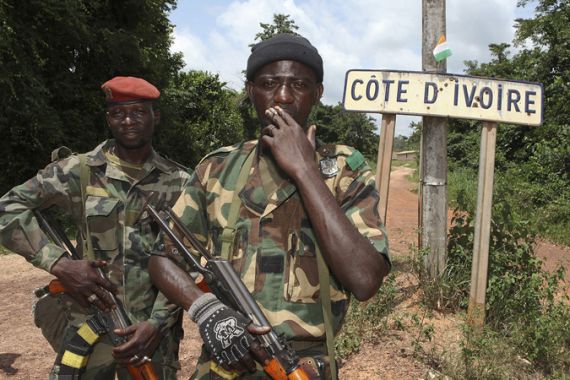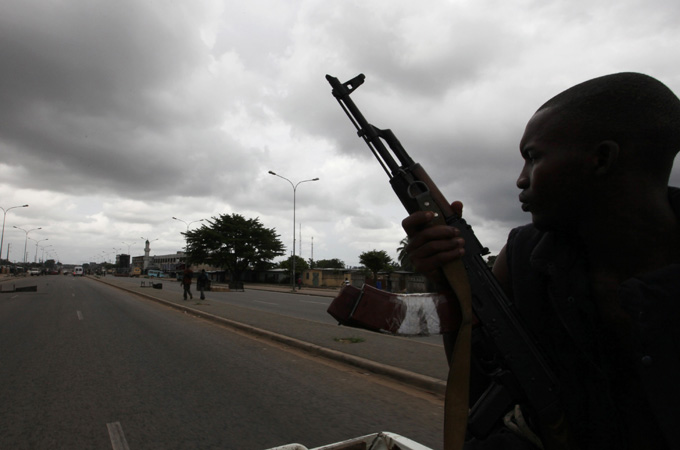‘African politics at a crossroads’
Al Jazeera speaks to journalist Ayo Johnson about the latest developments in Cote d’Ivoire.

 |
| Fighting in Ivory Coast’s Abidjan is spreading and the death toll is mounting [Reuters] |
The conflict in Cote d’Ivoire has been ongoing since Laurent Gbagbo refused to step down after UN-certified results showed he lost a run-off election to Alassane Ouattara in November 2010. In what appears to be a cut and dry topic, the dynamics playing out in Cote d’Ivoire are anything but. Al Jazeera’s Azad Essa speaks to Ayo Johnson, a journalist and director of Viewpoint Africa, about some of the more nuanced aspects to the situation in Cote d’Ivoire.
International consensus supports Alassane Ouattara, based on the election results. Is there any other reason the world might be standing along side Ouattara that the media are not picking up on?
Laurent Gbagbo and Alassane Ouattara have been in conflict for a long time. They despise each other and do not trust one another; they both command large [swaths] of the country with Gbagbo’s Christian south and Ouattara’s Muslim north. This distrust has led to a civil war previously and now war and conflict looms again as a result of this current election dispute.
The West African region does not need further upheaval [and] after wars in Liberia and Sierra Leone all members of the Manor River Union including those of the wider ECOWAS do not want a return to repeated trend of conflict during and after general elections. It sends the wrong signals, it can be infectious and could spread to other countries. [In saying that] there are way too many fragile states in West Africa … the elements that lead to their fragility: lack of good governance, rule of law, excessive poverty, inequality and lack of access to healthcare and education – meaning that conflict is likely in other countries that can ignite by a spark from Ivory Coast. Especially if an influx of refugees into host countries with weak infrastructures get stretched resulting in uprisings in their country.
The international community is tired of having elections hijacked with disputes that result in stalemates and a loss of life. They want to set an example with Cote d’Ivoire and say no to this type of behaviour. Most countries in Africa are experiencing their 50th year of independence and conflict does the continent harm, further tarnishes its image and could stifle investment growth and prosperity.
Gbagbo struggled himself in the late ’80s against Cote d’Ivoire’s first post-independence president Felix Houphouet-Boigny who was in power for 29 years and over stayed his welcome. Gbagbo is reported to have even said: “I take inspiration from Boigny, everything he does is what we should not do.” Why is he then trying to hold on to power? What is his ambition and why does he think he can get away with it?
This current stalemate shows a country that has lost it way, simply because the people have not been heard. The situation makes a mockery of the judiciary and shows failings and weakness in the electoral commission [as a result], holding the entire county to ransom. Hence both supporters of Ouattara and Gbagbo feel that they should be in charge and have the legal mandate to govern.
We have witnessed a similar situation in Zimbabwe and Kenya where election results triggered local reaction from the population and violence from the two sides. Eventually following mediation and talks a compromise was reached with a unity government otherwise known as a marriage of convenience. But we know that these do not work and it is the wider population that lose out and ultimately do not ”get value for money” with those that are in power to serve in their best interests.
Gbagbo understands these issues, knows how the African Union have responded to the crises in other countries around him and is relying very heavily on the army. He has been playing for time … hoping for a unity government sharing of power or the like via negotiations.
You said that power sharing does not work … but is a unity government a feasible option in Cote d’Ivoire?
A unity government may be an option if the current stalemate between Ouattara and Gbagbo is not resolved. But it would appear that intervention consensus currently is not for a unity government but instead, a military intervention. This is very dangerous as it could ignite a civil war and the Economic Community of West African States (ECOWAS) could be dragged into a long protracted conflict that may not have an immediate end in sight.
There is also the possibility that ECOWAS may not be able to afford a long-term ground offensive in addition to the troop numbers that will be needed. [But] ECOWAS’s future will also be in the balance and its credibility questionable [especially] if it makes threats of a military offensive and does not follow it through.
I feel that military option is not a realistic prospect and all stakeholders will have to find a way to talk their way out of this crisis.
People talk about crisis creating risks to the West African region. Is there a real threat to the stability of neighbouring countries?
There could also be deep seated bitterness between northern and southern Ivorians that could last for generations to be reconciled. The entire West African region risk its own development and economical prosperity with the likelihood of a spread of the war to neighbouring countries, not to mention the spill over of refugees into neighbouring countries many of whose infrastructure can barely cope to address immediate needs of their citizen; let alone the additional influx of foreigners seeking humanitarian assistance. The risk is real.
But why does this keep happening in Africa? All the stereotypes and generalisations aside, similar events have occurred in Kenya, Zimbabwe, Cote d’Ivoire and Gabon within a few years of each other.
It is embarrassing and sad – but the reality is that African politics and democracy is at a crossroad. For some countries who I would like to describe as fragile states, fragile because a few have come through war, others have had coups, others have had repeated cycles of poor leadership and bad governance. And the conditions that lead to their fragility is ever so apparent. Hence many of such countries are in recovery mode and if not nurtured and supported could easily slip into their bad ways. This is a fact with Ivory Coast. Currently there are only a handful of African countries that meet the grade of governance – South Africa, Africa super power, Ghana, bright and sparkling and Nigeria aspiring to reach its potential and well on track.
These are a few countries that have met international acceptable standards of governance. Africa as a whole has a long way to go in terms of being responsible and accountable. But with time the African continent can change and be seen to change and the rest of the world will see its better and progressive side.
Q. How do these ”fragile countries” break out of these cycles?
There is also a responsibility from the population to be far more educated to understand that during an election do not vote purely on tribal lines. As is ever so apparent across Africa where most vote for the man or woman that belongs to their tribe and cultural affiliation rather that the person who has the best policies. There is a need for the populace to become more educated and to choose wisely with their vote and understand the ramification of the choices they make and how best to use their vote.
Finally the electoral process of choosing a president or a leader for a country should be organised and controlled by ECOWAS. They should work closely with the electoral commission and the decision should be final. This way Disputes will be minimal and there will not be a risk that the process ha been compromised or sabotaged by tribalism or cultural affiliation
Do you foresee a situation where even if Gbagbo is forced to step down the south refuses to recognise
Ouattara’s leadership, more so the army?
The army is the problem; the army has to become far more mature and should restrict their role to protecting the country and not taking sides and interfering in politics. This is fundamentally what is wrong with African politics. The military seems to want to run the country. It is because they are very insecure and would like to protect their position, benefits and influence; especially if the army is not mixed with different ethnicities but dominated by one or a few tribes. This problem will not go away in the short term. Tribalism is the problem and it must be stopped.
Angola is one of the few countries to have openly supported Gbagbo. How do we understand this allegiance?
These are unconfirmed rumours that Gbagbo had sought the assistance of mercenaries from both Liberia and Angola to assist in his quest to retain power and crush any dissent that may arise. The Angolan government has denied these allegations. But Angola is one of very few countries in the world that continues to support Gbagbo. This provides opportunity for those who dislike Gbagbo to use this as a pretext to call for military intervention against his administration and state that Gbagbo is trying to retain power and control the country at all cost.
What is your take on the AU’s efforts at mediation thus far?
It shows that the African Union has not ruled out power sharing as a possibility; which only signifies that the talk of military confrontation is only a bluff and will fall flat on the faces of ECOWAS that have called for that measure.
I feel that power sharing is still an option but it is not the favourite option as [it does not] really benefit all stakeholders. In Zimbabwe, the marriage of convenience is not working and I could easily pick holes out of the situation in Kenya. So power sharing is very much a short term option and one that is not really favoured and should only be seen as such.
The role of the AU has been perceived to be weak. Is this a fair assessment?
The AU through its regional body ECOWAS has been weak: they don’t say what they mean and don’t mean what they say. They threaten force but don’t act, they have the mandate but don’t enforce. They know it is costly, time consuming, absorbing and could threaten the region and other neighbouring countries.
Smart sanctions, ie travel bans, bank account freezes and international isolation don’t work in the short or medium term. They are long-term solutions as they take awhile to be effective. Some leaders in Africa as in the case of Gbagbo wear this bad boy imagery as trophies to show that they can take it and continue their bad boy ways despite conventional forms of pressure.
Mediation, mediation and further mediation seems to be the only way forward. Force and wars have truly never really solved any problems, they risk making the situation worst, and should be avoided at all cost.
Barack Obama, the US president, said the other day that the US could not stand by and allow the slaughter of the Libyan people. What about Cote d’Ivoire? What would need to happen for an intervention … and would this be desirable?
These institutions like UN, AU and ECOWAS are not only weak but there are inconsistencies in the messages they preach and the actions they take. Humanitarian assistance calls for a UN resolution and coalition response with force – but this is absent in Cote d’Ivoire. It is down to mineral extraction, strategic importance, control of countries, change of governments, and the will and commitment to do so from the UN General Assembly and the Security Council.